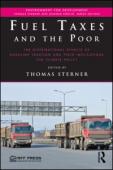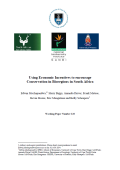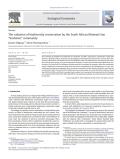As the global population heads toward 9 billion by 2050, decisions made today will lock countries into growth patterns that may or may not be sustainable in the future. Care must be taken to ensure that cities and roads, factories and farms are designed, managed, and regulated as efficiently as possible to wisely use natural resources while supporting the robust growth developing countries still need. Economic development during the next two decades cannot mirror the previous two: poverty reduction remains urgent but growth and equity can be pursued without relying on policies and practices that foul the air, water, and land.
The report discusses two crucial questions: How do “green” and “growth” hang together in practice? How will green environmental policies affect GDP growth, employment, and international competitiveness?
The report’s overarching finding is that policies to increase energy efficiency have substantial potential for green growth. A successful green growth policy will require South Africa to have solid, well-thought, and distinct policy agendas if it is to better pursue its growth and environmental objectives. While green policies can have large synergies and co-benefits with the growth and employment agendas, they are no substitute for it.

This book challenges the conventional wisdom that gasoline taxation, an important and much-debated instrument of climate policy, has a disproportionately detrimental effect on poor people. Increased fuel taxes carry the potential to mitigate carbon emissions, reduce congestion, and improve local urban environment. As such, higher gasoline taxes could prove to be a fundamental part of any climate action plan. However, they have been resisted by powerful lobbies that have persuaded people that increased fuel taxation would be regressive. Reporting on examples of over two dozen countries, this book sets out to empirically investigate this claim. The authors conclude that while there may be some slight regressivity in some high-income countries, as a general rule, fuel taxation is a progressive policy particularly in low income countries. Rich countries can correct for regressivity by cutting back on other taxes that adversely affect poor people, or by spending more money on services for the poor. Meanwhile, in low-income countries, poor people spend a very small share of their money on fuel for transport.

Many protected areas are not successfully conserving biodiversity, often despite adequate management within their borders. Changes in land use outside protected areas can alter ecological function inside protected areas and result in biodiversity loss given that protected areas are almost always parts of larger ecosystems. Economic incentives are seen as one of the most promising avenues to influence conservation goals. This paper deals with enabling these in the now commonly accepted notion of bioregional landscape management. It suggests a holistic framework to help understand where and how such incentives may function. It then discusses a range of desired incentives, and relate as many of these as possible to potential underlying institutional changes. Without going into country-specific details, several southern African examples are used, all the while relating both principles and examples to bioregionalism. We conclude that incentives for bioregional conservation in southern Africa are far more likely to succeed if key institutions can be introduced.

The restitution of parkland to the Khomani San “bushmen” and Mier “agricultural” communities in May 2002 marked a significant shift in conservation in the Kgalagadi Transfrontier Park and environs in South Africa. Biodiversity conservation will benefit from this land restitution only if the Khomani San, who interact with nature more than do other groups, are good environmental stewards. To assess their attitude toward biodiversity conservation, this study used the contingent valuation method to investigate the economic values the communities assign to biodiversity conservation under three land tenure arrangements in the Kgalagadi area. For each community and land tenure arrangement, there are winners and losers, but the winners benefit by more than the cost that losers suffer. The net worth for biodiversity conservation under the various land tenure regimes ranged from R928 to R3456 to R4160 for municipal land, parkland, and communal land respectively for the Khomani San, compared to R25 600 to R57 600 to R64 000 for municipal land, parkland, and communal land respectively for the Mier.
